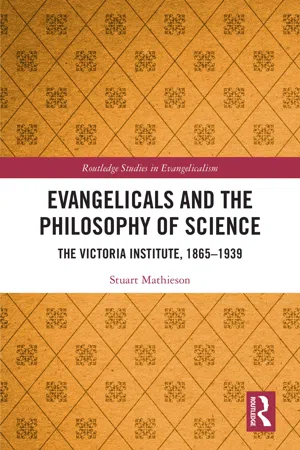![]()
1 A safe haven for true science
‘Nobody of note in science, in literature, or theology is likely to be induced to embark his name or his reputation in the adventure’. It is safe to say that the editorial staff at the Birmingham Daily Post were unimpressed at having received a document which ‘has made us rub our eyes and ask if the thing can be a reality, or if it is nothing more than a very ponderous joke’. The offending document was a circular announcing the formation of the Victoria Institute, or Philosophical Society of Great Britain, and which detailed its membership, its plans, and its objectives. The Post questioned the quality of the Victoria Institute’s membership, apart from the Earl of Shaftesbury, mocked its grandiose ambitions, and disapproved of its ‘foolish impression that science and religion are antagonistic’.1 Some of these criticisms were entirely reasonable. The Victoria Institute failed to reach many of its lofty goals, such as obtaining a royal warrant, Queen Victoria agreeing to become its patron, her husband Prince Albert accepting its honorary presidency, or a series of likeminded sister institutes appearing across the world. Its early belligerence and unnecessary combativeness dissuaded several distinguished figures from joining or continuing their membership. Yet some notable names could be found among the almost 200 on its initial membership list. Shaftesbury, a ubiquitous figure on the councils of evangelical societies, was certainly the best known, but there were others from his circle of philanthropic gentleman evangelists, such as John Derby Allcroft, Benjamin Bond Cabbell, and the Earl of Carnarvon. There were also well-known evangelical ministers, such as William Arthur and William Pennefather, while Joseph Baylee and Edward Garbett would have been familiar to readers of the Record, the newspaper of the evangelical party within the Church of England.2 Fewer scientists had signed up, although the entomologist Thomas Vernon Wollaston and the chemists George Warington and John Hall Gladstone were fairly well known for their religious beliefs, whereas Philip Henry Gosse, the Brethren naturalist and popular science writer, was famous both for sparking an aquarium craze and for his controversial attempt to unite Genesis and geology, Omphalos (1857).3 Eventually, however, the Victoria Institute could count among its members the physicists Sir George Gabriel Stokes and Lord Kelvin, the surgeon Joseph Lister, the archaeologist Flinders Petrie, the Assyriologist Archibald Henry Sayce, the Lord Chancellor, the Archbishop of Canterbury, and dozens of prominent evangelical theologians, including Handley Moule, Henry Wace, James Iverach, and Francis Landey Patton. While its more ambitious aims were never realised, the Victoria Institute was nevertheless a qualified success. During its heyday in the 1880s, it had nearly 2,000 members scattered across the Anglophone world. Its journal, Journal of the Transactions of the Victoria Institute (JTVI), was printed in London, Paris, Melbourne, Toronto, New York, Calcutta, and Cape Town and contained verbatim accounts of the papers presented at its London premises, where it also kept a library and reading room. It exchanged transactions with dozens of learned societies and institutions, from the Royal Society to the United States Geological Survey. Remarkably, despite declining fortunes and a collapse in membership following the First World War, the Victoria Institute still exists today, using the working name Faith and Thought.4
